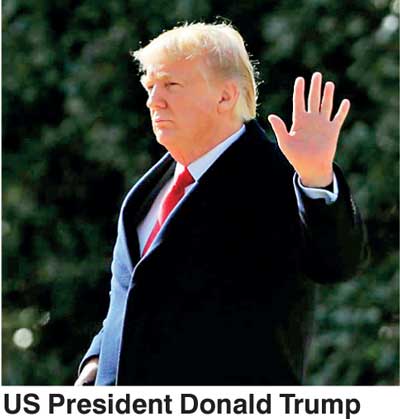Tuesday Feb 17, 2026
Tuesday Feb 17, 2026
Monday, 5 February 2018 00:00 - - {{hitsCtrl.values.hits}}
Palm Beach, Fla. (Reuters): US President Donald Trump said on Saturday that a controversial memo attacking federal law enforcement written by congressional Republicans vindicates him in the investigation of Russian meddling in the 2016 US presidential election.

Trump’s embrace of the memo raised again the prospect that he could use it as justification to fire special counsel Robert Mueller, who is conducting the investigation, or Deputy Attorney Rod Rosenstein, who oversees Mueller.
Tweeting from his resort in Palm Beach, Florida, Trump said the memo “totally vindicates” him but added “the Russian Witch Hunt goes on and on. Their (sic) was no Collusion and there was no Obstruction.” He called the investigation “an American disgrace.”
The White House has said there will be no changes at the Justice Department as a result of the memo’s conclusions.
The memo, written by Republicans on the US House of Representatives Intelligence Committee chaired by Devin Nunes, argues that the federal investigation of potential collusion between Trump’s 2016 presidential campaign and Russia was a product of political bias against Trump at the Federal Bureau of Investigation and Justice Department.
Trey Gowdy, the Republican chairman of the powerful House Oversight committee, disagreed with Trump and said the memo has no impact on the Russia probe.
“Not to me, it doesn‘t, and I was pretty integrally involved in the drafting of it,” Gowdy said in a preview of an interview to be aired on CBS’ “Face the Nation” on Sunday.
Gowdy, who said this week that he will not run for re-election in November, said the Russia investigation would exist regardless of a dossier that the memo says the FBI received from a source who was strongly biased against Trump.
“So there’s going to be a Russia probe, even without a dossier,” said Gowdy.
Trump approved the release of the formerly classified memo without redactions, despite objections from the FBI in a move that deepened tension between the White House and senior law enforcement that has existed since Trump took office.
Democrats contend the four-page memo mischaracterizes highly sensitive classified information and was intended to undermine the Mueller criminal probe that was launched in May 2017 as an outgrowth an earlier FBI investigation.
Jerrold Nadler, the top Democrat on the House Judiciary Committee, said Trump’s decision to allow the release of the memo was “part of a coordinated propaganda effort to discredit, disable and defeat the Russia investigation.”
Some Republicans were also critical of the memo’s release. John Kasich, the governor of Ohio and a former rival of Trump’s for the presidential nomination, called it “a disservice to our country.”
Asked by reporters on Friday whether the memo made him more likely to fire Rosenstein or whether he had confidence in him, Trump replied, “You figure it out.”
Dismissing Rosenstein or Mueller would trigger a political firestorm much like his sacking of FBI Director James Comey last year.
Mueller is also examining whether Trump has obstructed justice in trying to thwart the Russia investigation.
The memo alleges the FBI concealed the Democratic ties of a source the agency used to justify surveillance on Carter Page, a former Trump campaign adviser with links to Russia. It also published the names of senior FBI and Justice Department officials, including Rosenstein, who it said signed off on the surveillance.
The document was commissioned by Nunes, the Republican chairman of the House intelligence panel. He said it laid bare “serious violations of the public trust, and the American people have a right to know when officials in crucial institutions are abusing their authority for political purposes.”
On Saturday, Nadler circulated a memo to House Democrats disputing the conclusions of the Nunes memo and arguing that Page was a lawful target of surveillance, according to NBC News.